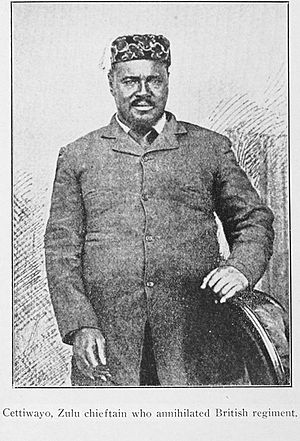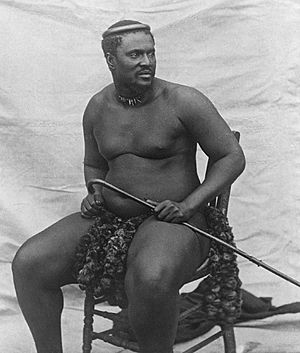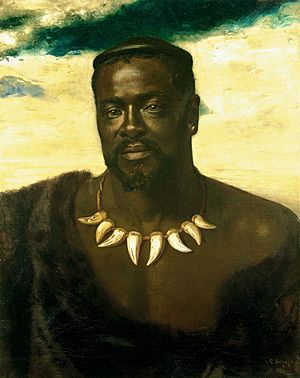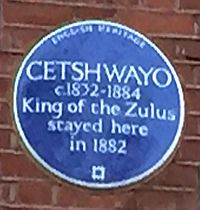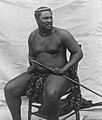Cetshwayo kaMpande facts for kids
Quick facts for kids Cetshwayo kaMpande |
|
|---|---|
| King of the Zulu Kingdom | |
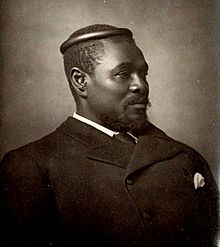
Photograph of Cetshwayo by Alexander Bassano in Old Bond Street, London
|
|
| Predecessor | Mpande |
| Successor | Dinuzulu kaCetshwayo |
| Born | c. 1826 Eshowe, Zulu Kingdom |
| Died | 8 February 1884 (aged 57–58) Eshowe, Zulu Kingdom |
Cetshwayo kaMpande (born around 1826 – died February 8, 1884) was a powerful leader. He was the king of the Zulu Kingdom from 1873 to 1879. He led his people during the Anglo-Zulu War in 1879. His name can be spelled in different ways, like Cetawayo or Ketchwayo. He is famous for leading the Zulu nation to a big victory against the British at the Battle of Isandlwana. However, he was later defeated and sent away from his home.
Contents
Who Was Cetshwayo?
Cetshwayo was the son of Mpande, who was the Zulu king before him. His mother was Queen Ngqumbazi. He was also the half-nephew of the famous Zulu king Shaka.
In 1856, Cetshwayo had a major battle with his younger brother, Mbuyazi. Mbuyazi was his father's favorite. Cetshwayo won this battle, called the Battle of Ndondakusuka, and Mbuyazi was killed. After this, Cetshwayo became the main leader of the Zulu people. He was not officially king yet because his father was still alive. People at the time said he was very tall, about 6 feet 6 inches to 6 feet 8 inches. He also weighed around 25 stone (about 159 kg).
Cetshwayo had another brother, Umthonga, who was also a possible rival. Umthonga ran away to the Boers, who were Dutch settlers. Cetshwayo had to make deals with the Boers to get him back. This happened again in 1865. Cetshwayo worried that Umthonga would get help from the Boers to challenge his power.
Becoming King
King Mpande died in 1872. His death was kept secret for a short time to make sure Cetshwayo could become king smoothly. Cetshwayo officially became king on September 1, 1873.
A British official named Sir Theophilus Shepstone helped crown Cetshwayo. However, Shepstone later turned against the Zulus. This happened because Cetshwayo was good at negotiating for land. A special group looked into land ownership and decided the land belonged to the Zulus. But the British ignored this decision.
As king, Cetshwayo built a new capital city called Ulundi, which means "the high place." He made his army stronger and brought back many of the fighting methods used by King Shaka. He also got muskets (old guns) for his soldiers. He asked European missionaries to leave his land.
The Anglo-Zulu War
In 1878, a British leader named Sir Henry Bartle Frere wanted to unite South Africa under British rule. He felt he couldn't do this with a strong, independent Zulu kingdom nearby. So, he started making demands and complaints to Cetshwayo. Frere wanted to make the Zulu king angry enough to start a war.
Cetshwayo tried to stay calm. He saw the British as friends and knew how powerful their army was. He said that he and Frere were equals. He believed that just as he didn't complain about Frere's rule, Frere should not complain about his.
Eventually, Frere gave Cetshwayo an ultimatum. This was a final demand that said Cetshwayo had to break up his army. Cetshwayo refused, and this led to the Anglo-Zulu War in 1879. Even after the war started, Cetshwayo kept trying to make peace.
The Zulus won a huge but costly victory over the British at the Battle of Isandlwana. Other British forces also struggled. The British faced more defeats at the Battle of Intombe and the Battle of Hlobane. However, the British later won important battles at Rorke's Drift and Battle of Kambula. After their early defeats, the British retreated. Cetshwayo could have attacked deeper into British territory, but he chose not to. He only wanted to push the British back, not cause more trouble.
The British then returned to Zululand with a much bigger and better-armed force. They finally captured the Zulu capital at the Battle of Ulundi. In this battle, the British used cannons and Gatling Guns. The battle lasted about 45 minutes before the British won. After Ulundi was captured and burned on July 4, Cetshwayo was removed from power. He was sent away, first to Cape Town, and then to London. He returned to Zululand in 1883.
While he was away, many people supported him. Lady Florence Dixie, a writer for a London newspaper, wrote articles and books to help him. His calm and respectful manner also made people feel sympathy for him. They felt he had been treated unfairly by the British.
Later Life and Legacy
By 1882, there were serious disagreements among the Zulu people. Some supported Cetshwayo (called uSuthus), and others supported rival chiefs, especially UZibhebhu. This led to a civil war.
In 1883, the British tried to help Cetshwayo rule part of his old territory again. But this attempt did not work. Chief UZibhebhu, with the help of Boer soldiers, started a war over who should be king. On July 22, 1883, UZibhebhu attacked Cetshwayo's new home in Ulundi. Cetshwayo was hurt but managed to escape into the forest.
After being asked by a British official, Cetshwayo moved to Eshowe. He died there a few months later, on February 8, 1884. He was between 57 and 60 years old. It is thought he died from a heart attack, but some people believe he might have been poisoned. He was buried in a field near the forest.
Cetshwayo is remembered as the last king of an independent Zulu nation. His son, Dinuzulu kaCetshwayo, became king on May 20, 1884. A special blue plaque in London remembers Cetshwayo at 18 Melbury Road, Kensington.
In Popular Culture
Cetshwayo appears in several adventure novels by H. Rider Haggard. These include The Witch's Head (1885), Black Heart and White Heart (1900), and Finished (1917). He is also in Haggard's non-fiction book Cetywayo and His White Neighbours (1882). He is mentioned in John Buchan's novel Prester John.
A character in the 1889 opera Leo, the Royal Cadet was named after him.
In the 1964 film Zulu, Cetshwayo was played by Mangosuthu Buthelezi. Buthelezi was Cetshwayo's own great-grandson. He later became a famous leader in South Africa.
In the 1979 film Zulu Dawn, Cetshwayo was played by Simon Sabela.
In the 1986 TV miniseries Shaka Zulu, he was played by Sokesimbone Kubheka.
Legacy
In 2016, a district in South Africa was named after him. It is called the King Cetshwayo District Municipality.
Images for kids
-
A cartoon from 1882 by E. C. Mountford. It shows Cetshwayo being lectured by John Bright, a British politician.
See also
 In Spanish: Cetshwayo para niños
In Spanish: Cetshwayo para niños
 | Sharif Bey |
 | Hale Woodruff |
 | Richmond Barthé |
 | Purvis Young |


